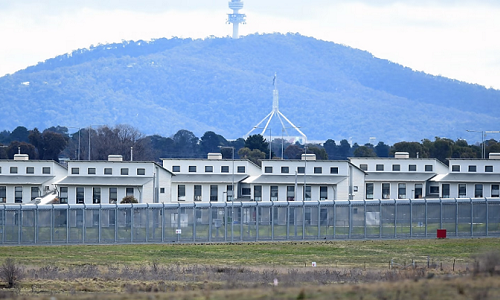Nearly a third of Canberra’s average prison population is Indigenous, despite Indigenous Canberrans constituting only 2% of the ACT population.
This is according to national data released by the Productivity Commission, the Australian Government’s independent research and advisory body on various economic, social and environmental issues.
The Australian Capital Territory is currently facing a significant challenge, with the highest rate of incarceration rates for Indigenous people in the nation compared to non-Indigenous residents.
Key Points:
Disproportionate Incarceration Rates: Productivity Commission figures reveal that 27% of Canberra’s average prison population is Indigenous, despite Indigenous Canberrans constituting only 2% of the ACT population, according to the 2021 census. Indigenous Canberrans are 24.6 times more likely to be incarcerated than their non-Indigenous counterparts, a disparity significantly higher than the national average of 17.4.
Government Response: ACT Attorney-General Shane Rattenbury has acknowledged the unacceptable rates of Indigenous incarceration and the need for improvement. The Government has committed to reducing the incarceration of Indigenous people to match non-Indigenous incarceration rates by 2031.
Review Structure: A review commissioned by the ACT Government and run by the Jumbunna Institute at the University of Technology Sydney will produce two reports. The first, expected in May, will evaluate the ACT’s implementation of the Australian Law Reform Commission’s recommendations from the 2018 Pathways to Justice Report. The second report, due later in the year, will propose additional practical measures to decrease Indigenous incarceration rates.
Community Engagement: The review emphasised collaboration with Indigenous people with personal experience in the justice system and Indigenous organisations. ACT Attorney-General Shane Rattenbury said the review team would engage with Indigenous people who have lived experience of the ACT justice system and local Indigenous organisations, including Yeddung Mura and Winnunga Nimmityjah. Professor Lindon Coombes, leading the review by the Jumbunna Institute, expressed confidence in developing practical recommendations through close work with the ACT Indigenous community.
Calls for Effective Action: Julie Tongs, CEO of Winnunga Nimmityjah Aboriginal Health and Community Services, highlighted the absence of support programs for integrating offenders into the community and called for alternatives to incarceration and investment in justice reinvestment programs.
Addressing Undiagnosed Hearing Loss Among First Nation Australians in Incarceration: A Crucial Step in Reducing Disparities.
Deafness Forum Australia and its members have been involved in various reports to the Australian Government highlighting the high rates of hearing loss amongst First Nations people. We have been advocating for improved funding, resources, and programs to address these health disparities.
A critical yet often overlooked aspect of the plight of First Nation Australians in incarceration warrants attention: undiagnosed and untreated hearing loss.
While the ACT Government review being undertaken by Jumbunna Institute promises to shed light on systemic issues contributing to Indigenous overrepresentation in prisons, it is imperative to acknowledge the multifaceted health challenges faced by incarcerated Indigenous individuals. Among these challenges, undiagnosed hearing loss is a significant yet under-recognised issue that demands immediate action and intervention.
Recent studies have highlighted the disproportionately high prevalence of hearing loss among Indigenous Australians, attributed to a myriad of factors, including historical trauma, intergenerational disadvantage, limited access to healthcare services, and socioeconomic disparities. Unfortunately, within the context of incarceration, the problem is often exacerbated due to inadequate screening protocols and a lack of culturally sensitive healthcare provision within correctional facilities.
The consequences of untreated hearing loss in prison settings are far-reaching and profound. Communication barriers exacerbate social isolation, impede access to educational and vocational programs, hinder rehabilitation efforts, and heighten the risk of conflict and misunderstanding between inmates and correctional staff. Moreover, undiagnosed hearing loss can perpetuate cycles of recidivism as individuals struggle to reintegrate into society upon release due to unaddressed communication deficits.
Addressing the issue of undiagnosed and untreated hearing loss among First Nation Australians in incarceration demands a multifaceted approach that prioritises culturally competent healthcare provision, comprehensive screening protocols, and targeted interventions tailored to the unique needs of Indigenous inmates. Collaboration between healthcare providers, correctional authorities, Indigenous community leaders, and advocacy organisations is essential to develop and implement sustainable solutions that promote equitable access to healthcare services and address the underlying social determinants driving disparities in hearing health outcomes.
It is incumbent upon policymakers, healthcare professionals, and stakeholders to recognise the intersecting dimensions of Indigenous health inequities within the criminal justice system and prioritise strategies that foster holistic wellbeing and rehabilitation for incarcerated First Nation Australians. By acknowledging and addressing the prevalence of undiagnosed hearing loss, we can take a significant step towards dismantling systemic barriers and advancing the cause of justice, equity, and reconciliation for Indigenous peoples in Australia.
You can read the full report and recommendations from Deafness Forum Australia.

